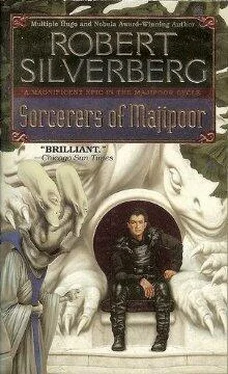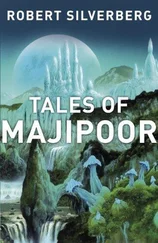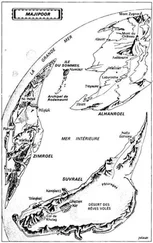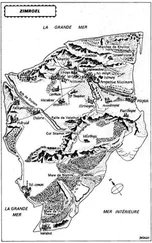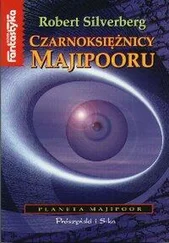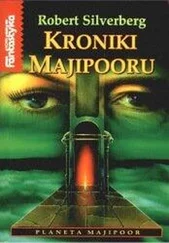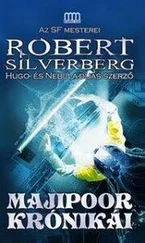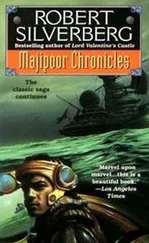Svor, who had been here before, only smiled, and told him to wait and see what lay ahead.
They were passing now around an intricate array of thermal pools that gurgled and heaved and moaned and seemed about to deluge them with boiling fluids. The sky here was gray-blue with smoke even at midday, and the air had a bitter chemical reek. The sun could not be seen. Their skins were covered quickly with dark grimy exhalations; Prestimion watched Septach Melayn draw his fingernails lightly across his cheek and leave pale tracks in the murk. Yet this place, horrid as it was, was inhabited. Many-legged slithering things with shining rosy hides moved about everywhere, close to the ground, looking up and studying them warily through rows of beady black eyes that bulged above their foreheads.
A shelf of blunt rock closed in this place of geysers and hot pools at its farther end, stretching off to north and south. They scrambled qulckly up it, despite myriad loose stones that made footing tricky, and descended on the cliff’s western face into a zone so extraordinary that Prestimion knew they must be at the domain of the Fountain itself.
By the deep light of the smoke-filtered sun he sawa coinpletely naked fiatland: not a bush, not a tree, nota rock, only a level span of land running from the extreme left to the extreme right, and curving away from them over the belly of the world. The soil was brick-red. And straight ahead of them on the plain rose a tremendous column of light bursting from the ground and rising with perfect straightness, like a great marble pillar, losing its upper end in the lofty atmosphere. The column was half a mile in width, Prestimion guessed, and had the sheen of polished stone.
“Look you,” Svor said. “It is the Gulikap.”
Not stone, no, Prestimion realized: an upwelling of sheer energy, rather. Motion was evident within its depths: huge sectors of it swirled, dashed, tangled, blended. Colors shifted randomly, now red predominating, now blue, now green, now brown. Some areas of the column appeared more dense in texture than others. Sparks often detached themselves and fluttered off to perish. The column at its uncertain summit blended imperceptibly with the clouds, darkening and staining them. There was a constant hissing, crackling sound in the air, as of an electric discharge.
Prestimion found that single mighty rod of brilliance in the midst of this forlorn plain an overwhelming sight. It was a scepter of power, it was a focus of change and creation; it was an axis of might on which the entire giant planet could spin.
“What would happen to me, do you think, if I were to touch it?” he asked Svor.
“You would be dissolved in an instant. The particles of your body would dance forever in that column of light.”
They went as close as they dared. It was possible to see now that a broad calcified rim, bone-white, porcelain-smooth, surrounded the Fountain. The incredible surge of many-colored light came roaring up through that rim from some immense dark abyss. What forces were at play down there, Prestimion could scarcely begin to guess. But, staring wonderingly at this mighty thing that lay before them, he was struck as though for the first time with a sense of the majestic splendor of his native world, of the overwhelming beauty and grandeur of it, of Majipoor’s infinite variety of marvels. And felt great sadness that some of that beauty and grandeur must now be marred by warfare. Yet there was no choice. There was a disharmony in the world that had to be cured, and war was the only way.
He contemplated the Fountain a long while. Then he gave the order to move on around it and continue the westward march.
They were thirteen days crossing the Ekesta Pass, which Nemeron Dalk said was faster than any crossing of it that he had ever heard of; they marched day and night with scarcely any pause, as if Navigorn’s troops were treading on their heels. It was a considerable ordeal, but, as Thalnap Zelifor had predicted, not an impossible one, only very difficult.
The Trikkalas were rugged mountains that rose to jagged points like those of a lizard’s crest, and the road across the pass was nothing more than a rough trail, in some places much less than that. There was little up here to eat, and most of that provided not much in the way of nourishment and even less in the way of pleasure, and the air was dry and cool and thin, so that at times even breathing was painful. But they marched swiftly and without complaint, and carried out the crossing without incident. Even the much-dreaded vorzaks kept their distance, confining themselves to a furious yipping and baying from the safety of their hilltop caves. At last the travelers came down on the far side of the hills in a mood of gratitude and relief.
Now they were in open country, lightly wooded, with towns here and there sparsely scattered. The air was softer here, for they were entering the valley of the Jhelum, and tributary streams flowed past them on every side.
The Jhelum itself was broad and swift, too wide for bridging in this region. But there were no rapids or other evident hazards, and they set about building boats and rafts from the abundant trees that lined the shore. It took three days to get all the men and equipment across.
The only troublesome moment came when the great blunt shining head and long thick neck of a gappapaspe rose from the water no more than twenty yards in front of Gialaurys’s boat, the gigantic thing loomed up high above them like an ogre, filling the sky and bringing some of the men close to panic. But all it did was stare. Gappapaspes were harmless browsers on river-weeds and bottom-muck; the only danger they posed to the travelers was that if one of them should come to the surface directly beneath a raft or boat, it would shatter it like matchsticks and hurl them into the water, where less harmless creatures might be waiting. But they saw only the one lone behemoth, which after a time slid down out of view again and vanished in the gray-brown depths.
West of the river they found themselves in settled country again, bustling cities of medium size surrounded by agricultural zones; and here, as soon as Prestimion announced himself to the people, they greeted him as a deliverer and as their Coronal. In these parts people knew little of Korsibar, and found it hard to understand how he had been able to take possession of the throne, when a Coronal’s son was never supposed to follow his father to the kingship. Among these good conservative countryfolk Prestimion was gladly hailed as the rightful king and they flocked eagerly to his standard.
He set up his camp as he had planned, in the great Marraitis meadowlands, where for thousands of years the finest mounts of Majipoor had been reared. The best breeders came to him with their herds of strong fighting animals, and freely made the most spirited of them available for his cavalry.
Word went forth far and wide, too, that Prestimion was collecting an army to march on Castle Mount and overthrow the false Coronal; and the response was enthusiastic. Hardly a day went by without a detachment of troops from some city of the region arriving at his camp. “I would rather die here with you than abide that unlawful man in the Castle,” is what they told him, over and over again. And so Prestimion welcomed gladly into their midst such men as the white-bearded Duke Miaule of Hither Miaule, with some five hundred green-jacketed warriors skilled at handling mounts; and Thurm of Sirynx, with a thousand more all clad in that city’s turquoise stripes; and the radiant young golden-haired Spalirises, son of Spalirises of Tumbrax, at the head of a great force; and Gynim of Tapilpil, with a corps of sling-casters in purple jerkins; and bold Abantes of Pytho, and Talauus of Naibilis, and many more of that caliber; and also troops from Thannard and Zarang and Abisoane and two dozen other places that Prestimion had never heard of, but whose assistance he welcomed all the same. The outpouring of support amazed and gratified him greatly. His brothers Abrigant and Taradath came too, with what seemed like half the able-bodied men of Muldemar city. They said that Teotas, the youngest brother, would have joined them also, but that their mother the Princess Therissa refused to let him go.
Читать дальше
